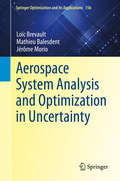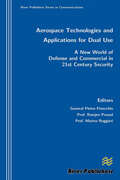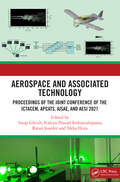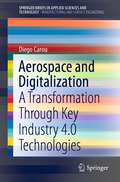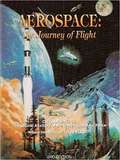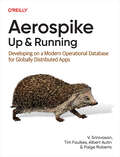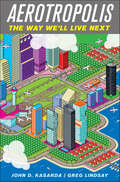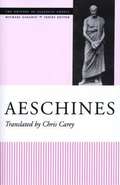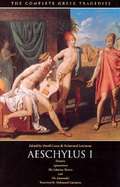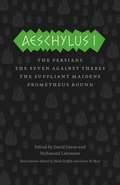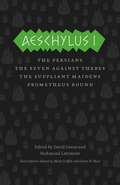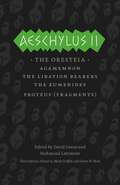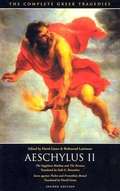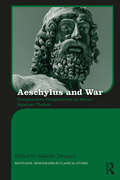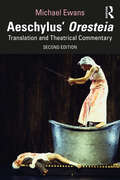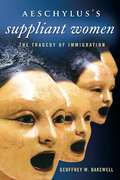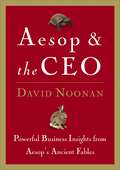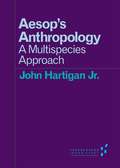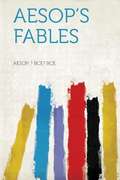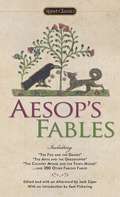- Table View
- List View
Aerospace System Analysis and Optimization in Uncertainty (Springer Optimization and Its Applications #156)
by Loïc Brevault Mathieu Balesdent Jérôme MorioSpotlighting the field of Multidisciplinary Design Optimization (MDO), this book illustrates and implements state-of-the-art methodologies within the complex process of aerospace system design under uncertainties. The book provides approaches to integrating a multitude of components and constraints with the ultimate goal of reducing design cycles. Insights on a vast assortment of problems are provided, including discipline modeling, sensitivity analysis, uncertainty propagation, reliability analysis, and global multidisciplinary optimization. The extensive range of topics covered include areas of current open research. This Work is destined to become a fundamental reference for aerospace systems engineers, researchers, as well as for practitioners and engineers working in areas of optimization and uncertainty. Part I is largely comprised of fundamentals. Part II presents methodologies for single discipline problems with a review of existing uncertainty propagation, reliability analysis, and optimization techniques. Part III is dedicated to the uncertainty-based MDO and related issues. Part IV deals with three MDO related issues: the multifidelity, the multi-objective optimization and the mixed continuous/discrete optimization and Part V is devoted to test cases for aerospace vehicle design.
Aerospace Technologies and Applications for Dual Use
by Ramjee Prasad Giacinto Losquadro Hugh Griffiths Marina Ruggieri S. Greco Alexander Soucek Albena Mihovska General Pietro Finocchio Pietro Finocchio Giuseppe Morsillo Mario L. Cosmo Paul E. Gartz Gerardo Lancia G. C. Grasso Enrico Saggese S. Venturi P. Massafra K. P. Doerpelkus Carlo Alberto Penazzi Renzo Meschini Armando Buccheri Marco Tommasi Giovanni Guidotti Nunzio Cocco Marina Grossi Daniele Mortari Carlo Des Dorides Mario Ciampini S. Vetrella L. Verde U. Ciniglio F. Corraro Andrea De Martino Sergio Attilio Jesi Volker Liebig Giuseppe Veredice Ole Mørk Lauridsen L. Pasquali Massimo Capaldo Vittorio Dainelli Cosimo La Rocca Alexander Mager Tiziano Sassorossi S. Arenaccio G. Chiassarini R. Loforti F. Petrosino A. Vernucci Claudio De Bellis Michel Feuga Elisa Tonello Domenico D'Angelo Mesut CicekerThe events occurred in the last years have shown how the threat related to both intentional and natural disasters could bring the civil and the military worlds closer in the conceivement and deployment of countermeasures as well as in the identification of effective strategies for enhancing the Planet safety and security. In this frame, the concept of dual use ? the set of technologies and applications that can be exploited for both civil and military purposes - becomes a key-topic. In addition, the aerospace is a strategic building block in the deployment of a network centric environment that aims at the global protection of the mankind. Aerospace is also a natural environment for dual use: many of the related enabling technologies have been first developed for the military world and then applied to civil ? including commercial - purposes.On September 12-14, 2007 an International Symposium has been held in Roma, Italy, joining the dual use approach with the aerospace technology: the international community has been gathered around the key-topic: aerospace technologies and applications for dual use. The event has called experts and operators from the military and civil community, belonging to industry, scientific and governmental institutions. The common aim was an effective convergence between the available and perspected technologies for the civil and military worlds as well as the conceivement of applications that can take the maximum benefit from the dual approach, optimizing the available economic resources. The Symposium has included invited-only contributions and an industrial panel. The main results of the Symposium, derived from key-note speeches, invited lectures, panel discussions and conclusions have created the starting material to develop this Edited Book.
Aerospace and Associated Technology: Proceedings of the Joint Conference of ICTACEM 2021, APCATS 2021, AJSAE 2021 and AeSI 2021
by Anup Ghosh Kalyan Prasad Sinhamahapatra Ratan Joarder Sikha HotaThe International Conference on Theoretical Applied Computational and Experimental Mechanics is organized every three years by the Department of Aerospace Engineering IIT Kharagpur. The conference is devoted to providing a platform for scientists and engineers to exchange their views on the latest developments in Mechanics since 1998. ICTACEM Conference is aimed at bringing together academics and researchers working in various disciplines of mechanics to exchange views as well as to share knowledge between people from different parts of the globe. The 8th ICTACEM was held from December 20-22, 2021, at the Indian Institute of Technology, Kharagpur.
Aerospace and Digitalization: A Transformation Through Key Industry 4.0 Technologies (SpringerBriefs in Applied Sciences and Technology)
by Diego CarouThis book reports a comprehensive study on the Industry 4.0 technologies focused on the aerospace sector, presenting a blueprint of the sector and the background of the key technologies. The author describes the adoption of some of these technologies by some of the major aerospace companies and organizations.
Aerospace: The Journey of Flight (Second Edition)
by Jeff MontgomeryA tremendous amount of cooperation and teamwork accompanied the production of this book, and we are extremely grateful to the many dedicated people and organizations who contributed their time, talents, and resources.
Aerospike: Developing on a Modern Operational Database for Globally Distributed Apps
by V. Srinivasan Paige Roberts Tim Faulkes Albert AutinIf you're a developer looking to build a distributed, resilient, scalable, high-performance application, you may be evaluating distributed SQL and NoSQL solutions. Perhaps you're considering the Aerospike database.This practical book shows developers, architects, and engineers how to get the highly scalable and extremely low-latency Aerospike database up and running. You will learn how to power your globally distributed applications and take advantage of Aerospike's hybrid memory architecture with the real-time performance of in-memory plus dependable persistence. After reading this book, you'll be able to build applications that can process up to tens of millions of transactions per second for millions of concurrent users on any scale of data.This practical guide provides:Step-by-step instructions on installing and connecting to AerospikeA clear explanation of the programming models availableAll the advice you need to develop your Aerospike applicationCoverage of issues such as administration, connectors, consistency, and securityCode examples and tutorials to get you up and running quicklyAnd more
Aerotropolis: The Way We'll Live Next
by Greg Lindsay John D. KasardaThis brilliant and eye-opening look at the new phenomenon called the aerotropolis gives us a glimpse of the way we will live in the near future—and the way we will do business too. Not so long ago, airports were built near cities, and roads connected the one to the other. This pattern—the city in the center, the airport on the periphery— shaped life in the twentieth century, from the central city to exurban sprawl. Today, the ubiquity of jet travel, round-the-clock workdays, overnight shipping, and global business networks has turned the pattern inside out. Soon the airport will be at the center and the city will be built around it, the better to keep workers, suppliers, executives, and goods in touch with the global market. This is the aerotropolis: a combination of giant airport, planned city, shipping facility, and business hub. The aerotropolis approach to urban living is now reshaping life in Seoul and Amsterdam, in China and India, in Dallas and Washington, D.C. The aerotropolis is the frontier of the next phase of globalization, whether we like it or not. John D. Kasarda defined the term "aerotropolis," and he is now sought after worldwide as an adviser. Working with Kasarda's ideas and research, the gifted journalist Greg Lindsay gives us a vivid, at times disquieting look at these instant cities in the making, the challenges they present to our environment and our usual ways of life, and the opportunities they offer to those who can exploit them creatively. Aerotropolis is news from the near future—news we urgently need if we are to understand the changing world and our place in it.
Aesch Mezareph or Purifying Fire: A Chymico-kabalistic Treatise Collected From The Kabala Denudata Of Knorr Von Rosenroth
by W. Wynn WestcottThe Aesch Mezareph or Ash Metzareph is a Kabbalistic and Alchemical text originally known to persons of Western Culture from the Latin translation found in a fragmentary condition in the work entitled “Kabbala Denudata” by Knorr von Rosenroth, published at Sulzbach in 1677-84.The present volume is the translation into English, which was issued by W. Wynn Westcott in Vol. IV of his Collectanea Hermetica at the end of the 19th century.
Aeschines
by Chris CareyThis is the third volume in the Oratory of Classical Greece series. Planned for publication over several years, the series will present all of the surviving speeches from the late fifth and fourth centuries B.C. in new translations prepared by classical scholars who are at the forefront of the discipline. These translations are especially designed for the needs and interests of today's undergraduates, Greekless scholars in other disciplines, and the general public. Classical oratory is an invaluable resource for the study of ancient Greek life and culture. The speeches offer evidence on Greek moral views, social and economic conditions, political and social ideology, and other aspects of Athenian culture that have been largely ignored: women and family life, slavery, and religion, to name just a few. This volume contains the three surviving speeches of Aeschines (390-? B.C.). His speeches all revolve around political developments in Athens during the second half of the fourth century B.C. and reflect the internal political rivalries in an Athens overshadowed by the growing power of Macedonia in the north. The first speech was delivered when Aeschines successfully prosecuted Timarchus, a political opponent, for having allegedly prostituted himself as a young man. The other two speeches were delivered in the context of Aeschines' long-running political feud with Demosthenes. As a group, the speeches provide important information on Athenian law and politics, Demosthenes and his career, sexuality and social history, and the historical rivalry between Athens and Macedonia.
Aeschylus I: Agamemnon, The Libation Bearers, The Eumenides (The Complete Greek Tragedies #1)
by Aeschylus David Grene Richmond Lattimore"These authoritative translations consign all other complete collections to the wastebasket."--Robert Brustein, The New Republic. "This is it. No qualifications. Go out and buy it everybody."--Kenneth Rexroth, The Nation. "The translations deliberately avoid the highly wrought and affectedly poetic; their idiom is contemporary.... They have life and speed and suppleness of phrase."--Times Education Supplement. "These translations belong to our time. A keen poetic sensibility repeatedly quickens them; and without this inner fire the most academically flawless rendering is dead."--Warren D. Anderson, American Oxonian. "The critical commentaries and the versions themselves... are fresh, unpretentious, above all, functional."--Commonwealth. "Grene is one of the great translators."--Conor Cruise O'Brien, London Sunday Times. "Richmond Lattimore is that rara avis in our age, the classical scholar who is at the same time an accomplished poet."--Dudley Fitts, New York Times Book Review.
Aeschylus I: The Complete Greek Tragedies, Third Edition
by David Grene Richmond Lattimore"Aeschylus I" contains The Persians, translated by Seth Benardete; The Seven Against Thebes, translated by David Grene; The Suppliant Maidens, translated by Seth Benardete; and Prometheus Bound, translated by David Grene. Sixty years ago, the University of Chicago Press undertook a momentous project: a new translation of the Greek tragedies that would be the ultimate resource for teachers, students, and readers. They succeeded. Under the expert management of eminent classicists David Grene and Richmond Lattimore, those translations combined accuracy, poetic immediacy, and clarity of presentation to render the surviving masterpieces of Aeschylus, Sophocles, and Euripides in an English so lively and compelling that they remain the standard translations. Today, Chicago is taking pains to ensure that our Greek tragedies remain the leading English-language versions throughout the twenty-first century. In this highly anticipated third edition, Mark Griffith and Glenn W. Most have carefully updated the translations to bring them even closer to the ancient Greek while retaining the vibrancy for which our English versions are famous. This edition also includes brand-new translations of Euripides "Medea," "The Children of Heracles," "Andromache," and "Iphigenia among the Taurians," fragments of lost plays by Aeschylus, and the surviving portion of Sophocles s satyr-drama "The Trackers. " New introductions for each play offer essential information about its first production, plot, and reception in antiquity and beyond. In addition, each volume includes an introduction to the life and work of its tragedian, as well as notes addressing textual uncertainties and a glossary of names and places mentioned in the plays. In addition to the new content, the volumes have been reorganized both within and between volumes to reflect the most up-to-date scholarship on the order in which the plays were originally written. The result is a set of handsome paperbacks destined to introduce new generations of readers to these foundational works of Western drama, art, and life. "
Aeschylus I: The Persians, The Seven Against Thebes, The Suppliant Maidens, Prometheus Bound (The Complete Greek Tragedies)
by AeschylusThe third edition of this volume includes newly revised, authoritative and compelling translations of four timeless works by the Ancient Greek tragedian.Aeschylus I contains “The Persians,” translated by Seth Benardete; “The Seven Against Thebes,” translated by David Grene; “The Suppliant Maidens,” translated by Seth Benardete; and “Prometheus Bound,” translated by David Grene. For this edition, Mark Griffith and Glenn W. Most have carefully updated these translations to bring them even closer to the ancient Greek while retaining the vibrancy for which the renowned University of Chicago Press series is famous. This edition also includes brand-new translations of Euripides’ Medea, The Children of Heracles, Andromache, and Iphigenia among the Taurians, fragments of lost plays by Aeschylus, and the surviving portion of Sophocles’s satyr-drama The Trackers. New introductions for each play offer essential information about its first production, plot, and reception in antiquity and beyond. In addition, each volume includes an introduction to the life and work of its tragedian, as well as notes addressing textual uncertainties and a glossary of names and places mentioned in the plays. The entire series has also been reorganized both within and between volumes to reflect the most up-to-date scholarship on the order in which the plays were originally written.
Aeschylus II: The Oresteia (The Complete Greek Tragedies)
by AeschylusThis updated translation of the Oresteia trilogy and fragments of the satyr play Proteus includes an extensive historical and critical introduction. In the third edition of The Complete Greek Tragedies, Mark Griffith and Glenn W. Most have carefully updated the translations to bring them even closer to the ancient Greek while retaining their vibrancy for which the Grene and Lattimore versions are famous. New introductions for each play offer essential information about its first production, plot, and reception in antiquity and beyond.Each volume also includes an introduction to the life and work of the tragedian and an explanation of how the plays were first staged, as well as notes addressing textual uncertainties and a glossary of names and places mentioned in the plays. The result is a series of lively and authoritative translations offering a comprehensive introduction to these foundational works of Western drama.
Aeschylus II: The Suppliant Maidens, The Persians, Seven against Thebes, Promethus Bound (The Complete Greek Tragedies #2) (2nd edition)
by Aeschylus David Grene Richmond LattimoreThis volume contains the other four plays of Aeschylus not included in Richmond Lattimore's version of the Oresteia. With these two volumes a complete English Aeschylus is before the reader.
Aeschylus and War: Comparative Perspectives on Seven Against Thebes (Routledge Monographs in Classical Studies)
by Isabelle TorranceThis volume brings together a group of interdisciplinary experts who demonstrate that Aeschylus’ Seven Against Thebes is a text of continuing relevance and value for exploring ancient, contemporary and comparative issues of war and its attendant trauma. The volume features contributions from an international cast of experts, as well as a conversation with a retired U.S. Army Lt. Col., giving her perspectives on the blending of reality and fiction in Aeschylus’ war tragedies and on the potential of Greek tragedy to speak to contemporary veterans. This book is a fascinating resource for anyone interested in Aeschylus, Greek tragedy and its reception, and war literature.
Aeschylus' Oresteia: Translation and Theatrical Commentary
by Michael EwansThis is a fully revised new edition of Michael Ewans’ 1995 English translation of the Oresteia, taking into account the extensive work published on the trilogy in recent years.Accompanying this lucid, accurate and actable translation is a substantial introduction, outlining the festival setting of the plays, the original performance conditions and performance style, the form and meaning of the trilogy, the issues surrounding the act of translation, and finally a survey of some major productions since 1980. The text itself is a thoroughly competitive translation into modern English verse, now significantly revised in the light of recent scholarship on the text. It is followed by a theatrical commentary on each scene and chorus, providing unique insights into how the plays might have been staged in ancient Athens and how they can be staged today. The book also includes notes on the translation, two glossaries of names and Greek terms, selected further reading, and a chronology of Aeschylus’ life and times.Aeschylus’ Oresteia: Translation and Theatrical Commentary is the most comprehensive English edition of Aeschylus’ masterpiece, and this new edition fully meets the needs of teachers, students and practitioners working on the trilogy as well as those interested in ancient Greek drama and literature more broadly.
Aeschylus's Suppliant Women
by Geoffrey W. BakewellThis book offers a provocative interpretation of a relatively neglected tragedy, Aeschylus's Suppliant Women. Although the play's subject is a venerable myth, it frames the flight of the daughters of Danaus from Egypt to Greece in starkly contemporary terms, emphasizing the encounter between newcomers and natives. Some scholars read Suppliant Women as modeling successful social integration, but Geoffrey W. Bakewell argues that the play demonstrates, above all, the difficulties and dangers noncitizens brought to the polis. Bakewell's approach is rigorously historical, situating Suppliant Women in the context of the unprecedented immigration that Athens experienced in the sixth and fifth centuries BCE. The flow of foreigners to Attika increased under the Pisistratids but became a flood following liberation, Cleisthenes, and the Persian Wars. As Athenians of the classical era became increasingly aware of their own collective identity, they sought to define themselves and exclude others. They created a formal legal status to designate the free noncitizens living among them, calling them metics and calling their status metoikia. When Aeschylus dramatized the mythical flight of the Danaids from Egypt in his play Suppliant Women, he did so in light of his own time and place. Throughout the play, directly and indirectly, he casts the newcomers as metics and their stay in Greece as metoikia. Bakewell maps the manifold anxieties that metics created in classical Athens, showing that although citizens benefited from the many immigrants in their midst, they also feared the effects of immigration in political, sexual, and economic realms. Bakewell finds metoikia was a deeply flawed solution to the problem of large-scale immigration. Aeschylus's Argives accepted the Danaids as metics only under duress and as a temporary response to a crisis. Like the historical Athenians, they opted for metoikia because they lacked better alternatives.
Aeschylus's the Oresteia (Modern Critical Interpretations)
by Harold BloomEssays by John Jones, Anne Lebeck, Froma I. Zeitlin, Pierre Vidal-Naquet, W. B. Stanford, and John Herington.
Aeschylus: The Oresteia
by Simon GoldhillThis is a general introduction in English to Aeschylus' Oresteia, one of the most important and most influential of all Greek dramas. It discusses the Greek drama festival and the social and political background of Greek tragedy, and offers a reading of this central trilogy. Simon Goldhill focuses on the play's themes of justice, sexual politics, violence, and the position of man within culture, and explores how Aeschylus constructs a myth for the city in which he lived. A final chapter considers the influence of the Oresteia on later theatre. Its clear structure and guide to further reading will make this an invaluable guide for students and teachers alike.
Aesop Kathakal
by AesopThis ebook is from DC Books, the leading publisher of books in Malayalam. DC Books' catalog primarily includes books in Malayalam literature, and also children's literature, poetry, reference, biography, self-help, yoga, management titles, and foreign translations.
Aesop and the CEO: Powerful Business Lessons from Aesop and America's Best Leaders
by David NoonanIt is easy to be overwhelmed by the sheer volume of business books flooding the market today. Even more daunting is the task of weeding through them to find the "golden nugget" of wisdom inside. Now David Noonan has simplified the process by providing this well-researched primer of the most essential advice from the greatest business books ever written. Further, in a clever melding of modern business sense and ancient wisdom, he has used the animal-based stories of Aesop as springboards to launch these 50 lessons. Both entertaining and informative, Aesop the CEO includes advice from well-known leaders such as Bill Gates, Sam Walton, Donald Trump, and Lee Iacocca. The short, easy-to-read vignettes cover every aspect of corporate life: negotiations, hiring and firing, mergers and acquisitions, marketing and sales, and day-to-day management.
Aesop's Anthropology: A Multispecies Approach (Forerunners: Ideas First)
by John Hartigan Jr.Aesop&’s Anthropology is a guide for thinking through the perplexing predicaments and encounters that arise as the line between human and nonhuman shifts in modern life. Recognizing that culture is not unique to humans, John Hartigan Jr. asks what we can learn about culture from other species. He pursues a variety of philosophical and scientific ideas about what it means to be social using cultural dynamics to rethink what we assume makes humans special and different from other forms of life. Through an interlinked series of brief essays, Hartigan explores how we can think differently about being human.Forerunners: Ideas First is a thought-in-process series of breakthrough digital publications. Written between fresh ideas and finished books, Forerunners draws on scholarly work initiated in notable blogs, social media, conference plenaries, journal articles, and the synergy of academic exchange. This is gray literature publishing: where intense thinking, change, and speculation take place in scholarship.
Aesop's Fables
by Aesop Jack Zipes Sam Pickering"Kindness is seldom wasted." --from "The Lion and the Mouse" It is both amazing and wonderful that so much of the richness of our language and our moral education still owes a huge debt to a Greek slave who was executed more than two thousand years ago. Yet "sour grapes," "crying 'wolf,'" "actions speak louder than words," "honesty is the best policy," and literally hundreds of other metaphors, axioms, and ideas that are now woven into the very fabric of Western culture all came from Aesop's Fables. An extraordinary storyteller who used cunning foxes, surly dogs, clever mice, fearsome lions, and foolish humans to describe the reality of a harsh world, Aesop created narratives that are appealing, funny, politically astute, and profoundly true. And Aesop's truth--often summed up in the pithy "moral of the story"--retains an awesome power to affect us, reaching us through both our intellects and our hearts. This exclusive Signet Classic edition contains 203 of Aesop's most enduring and popular fables, translated into readable, modern American English and beautifully illustrated with classic woodcuts by the great French artist J. J. Grandville. Includes: "The Fox and the Grapes" "The Ants and the Grasshopper" "The Country Mouse and the Town Mouse" Edited and with an Afterword by Jack Zipes With an Introduction by Sam Pickering
Aesop's Fables
by AesopA collection of fables credited to Aesop, a slave and story-teller believed to have lived in ancient Greece between 620 and 560 BCE.
